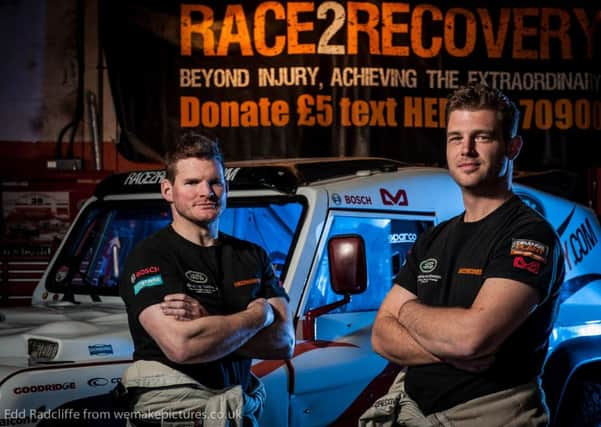Injured soldiers take on Dakar challenge


Race2Recovery, a group of severely injured soldiers who made history as the first disabled rally team to enter and complete the Dakar rally last year, is again taking part in this year’s running of the tough race. The team has entered two race vehicles into the 2014 Dakar.
The team again includes Quin Evans, 40, from Harrogate, who stepped in to help the team in a principal role last year and this year assumes the role of co-driver in the vehicle driven by Race2Recovery founder and below-the-knee amputee Tony Harris, a former captain in 2nd Battalion, Royal Regiment of Fusiliers.
Advertisement
Hide AdAdvertisement
Hide AdMr Evans, an able-bodied civilian member of the team, has been racing since he was 16, finishing third in the British Championship in 1997. He took part in his first Dakar Rally in 2004 and has finished 4th, 16th and 32nd and has completed seven Dakars.
Speaking ahead of the start, Mr Evans said: “I’m looking forward to forging a great partnership with Tony (Harris) in this year’s race.”
This year’s Race2Recovery team is made up of 16 injured soldiers and civilian volunteers, including drivers, co-drivers, support vehicle drivers and technical and mechanical experts.
The injured servicemen will be driving Land Rover Defender-based Wildcat rally-raid vehicles, as well as a T4 race truck and a T5 support truck, which will provide support for both race vehicles. Land Rover is assisting the team with parts, logistics, vehicle and financial support throughout their 2014 campaign.
Advertisement
Hide AdAdvertisement
Hide AdThe 14-day epic adventure ends on January 18 and goes through Argentina, Bolivia and Chile. They will travel over 9,000km, in a journey that will see them cross the Atacama desert, in temperatures that could reach between 40 to 50 degrees celsius. Visit www.race2recovery.com